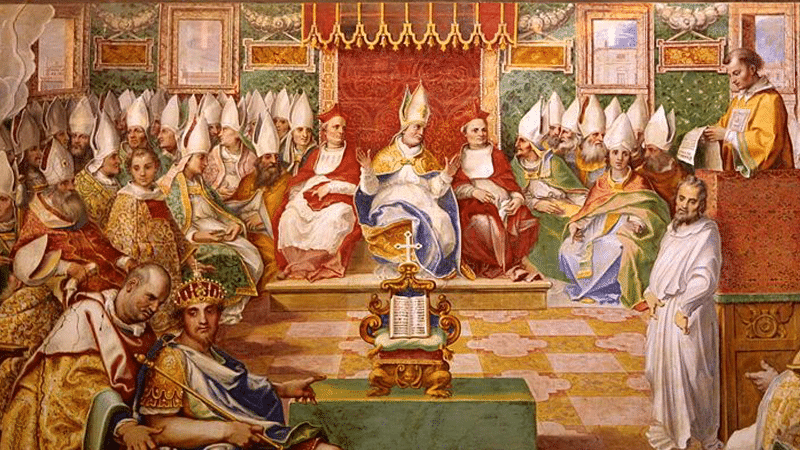The Council of Nicaea

On 19 June AD 325, the Nicene Creed was adopted by the First Ecumenical Council. History tells us that this was no ordinary church meeting.
Three hundred bishops, and even more presbyters and deacons, take their places in the Imperial Palace in the Bithynian city of Nicaea (now İznik, Turkey). A hush descends. Then the procession arrives, heralding the approach of Constantine, the Roman Emperor. One witness later reports seeing him “covered in a garment which glittered as if it were radiant with light, reflecting the glow of his purple robe, adorned with the brilliant splendour of gold and precious stones”. He seats himself on his gold throne, and the assembly which rose to welcome him holds its collected breath in eager anticipation.
But what had caused this global leader, this self-acclaimed protector of the Church, to convene such a meeting?
The Arian Controversy
From the Church’s earliest days, the doctrine of the Trinity was foundational to Christian belief. Jesus taught his followers to baptise “in the name of the Father and of the Son and of the Holy Spirit” (Matthew 28:19), and Paul’s benediction likewise expresses: “May the grace of the Lord Jesus Christ, and the love of God, and the fellowship of the Holy Spirit be with you all.” (2 Corinthians 13:14)
However, by the fourth century, confusion was brewing over the divinity of Christ, especially in the Eastern Church. Then, in AD 318, controversy erupted.From the church’s earliest days, the doctrine of the Trinity was foundational to Christian belief.
The popular preacher Arius (256-336) began to teach that the Father alone was God; the Son was of a similar, but not the same, substance. God may have created everything through the Son, but only the Father was the eternal and true God. Christ himself was created from nothing.
Arius was swiftly opposed by his bishop, Alexander, who deposed him as a heretic in 320. Yet the controversy continued to spread, with Arius seeking support from Eastern bishops. Many didn’t fully understand the arguments, but sides were taken and the Church became increasingly divided.
The Creed
As the first ‘Christian emperor’, Constantine considered it his duty to unite the Church and maintain peace. The matter would be settled at a council in Nicaea, drawing attendees from across the Roman world, perhaps even the remote isle of Britain. Whatever Constantine’s personal motivations – which are the subject of great speculation – Nicaea enabled the bishops to affirm teachings still considered foundational by churches today.
The Nicene Creed sets out that God is three in one: the Father who created all things; Jesus Christ, the only begotten Son; and the Holy Spirit. In opposition to Arius’ false teaching, it stated that Christ is “from the essence of the Father… light from light, true God from true God, begotten, not created”.
It also emphasised the purpose of Jesus’ incarnation: “Who for us human beings and for our salvation came down and was incarnate, was made man, suffered and rose again on the third day, ascended into heaven, and is coming again to judge the living and the dead.”
Later Church councils expanded the Creed into the form we are familiar with today, adding wording on the Holy Spirit, the Church, baptism and the resurrection.From the church’s earliest days, the doctrine of the Trinity was foundational to Christian belief.
Aftermath
Arius and some of his supporters were sent into exile. While most believers accepted the Creed, the debate continued for many years afterwards. Arianism, as it became known, remained influential until the seventh century.
Similar heresies re-emerged in the wake of the sixteenth century Reformation. While Luther, Calvin and others sought to bring the Church back in line with biblical teaching, some wanted to push for much more radical changes, teaching that Jesus did not exist before his human birth.
Such views led to the formation of Unitarian churches, out of which evolved the secular humanism we have today.
Standing firm
There will always be those who compromise on biblical doctrine. Like Arius, many spread false teaching, confusing others to gain their support.
Throughout the centuries, the Nicene Creed has been recognised as a clear statement of core Christian belief. Today, those words agreed centuries ago continue to point us to the enduring truth of God’s Word, and its transforming impact on the lives of believers throughout world history.
We must stand firm on the truth of the Bible, and pray that others will not be persuaded to make dangerous concessions to our increasingly secular society.
